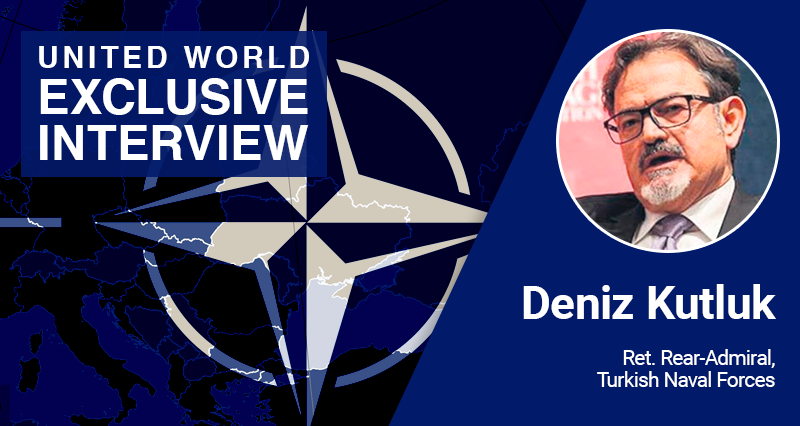By Mehmet Kıvanç
While Russia’s “special military operation” is continuing, initiatives to include Sweden and Finland as new members to NATO are gaining importance. While the world is curious about Russia’s reaction to a possible enlargement of NATO, experts agree that a possible NATO enlargement will cause new crises.
Retired Rear-Admiral Ali Deniz Kutluk in the Turkish Naval Forces, who has held senior positions in NATO for many years says, “There are issues we need to question” and asks: “Why should NATO include these countries philosophically?”
“What would Finland and Sweden contribute to the territorial integrity of the 30 members? Sweden has been a neutral state for 100 years. We can’t see the answer to this question. The Ukraine-Russia war cannot and should not be the justification for this enlargement. On the contrary, Russia expressed its views and declared these developments would create a risk to European security. If nothing is done, these countries are safe. If these countries are admitted to NATO as a fait accompli, there will be political and military consequences.”
Emphasizing that Russia is uncomfortable with NATO’s expansion, Kutluk said, “we also need to ask what the benefit of this expansion for NATO is?”
‘The crisis in Ukraine led to the conclusion that Finland and Sweden should join NATO.’ Writers in the West unite around this thesis…
Kutluk does not agree with this thesis:
“There is a perception management done around this thesis. I did social studies in Sweden and Finland about these two countries. They would say, ‘There is no NATO membership’ even if you threaten them by their life. As the Ukraine war enters its 72nd day, sixty-seventy percent of the population in these countries are in favor of NATO membership.”
“Is NATO’s growth right? It’s unmanageable right now. It has 30 member states. It also has 39 countries called partners. Would the inclusion of these countries to NATO provide more security or reduce the security even more?”
Expressing that enlargement will reduce security, Kutluk said, “It seems that NATO will accept Russia as a threat in its new strategic concept.” Recalling that Russia announced that it would take measures against possible enlargement, Retired Rear Admiral Kutluk said, “Then NATO takes a step towards creating a less secure environment. There seems to be something wrong here.”
Is NATO enlargement beneficial for Turkey?
“Will the inclusion of these countries into NATO contribute to Turkey’s security? It is not possible to answer this positively. Will it diminish NATO’s contribution to Turkey’s security? Yes. The number of NATO members will increase. Russia’s possibility of attack will increase since it is about to be perceived as a threat. Then Turkey will have to use its military units to protect these countries. Why would Turkey consent to a situation that would reduce its own security?”
Kutluk thinks if Turkey is going to take a decision to support the membership of Sweden and Finland, it should also look at what to get in return. He asks, “Will they recognize the TRNC? Will they support Turkey’s EU membership? Will the USA stop its arm support to the terrorist organization PKK?”
What happens if Trump is re-elected again?
Drawing attention to the decisive effect of domestic US politics on Atlantic affairs, Kutluk states that the possibility of re-election of Donald Trump should not be forgotten:
“If Trump is re-elected and as in the past, the US cools NATO relations; if he takes steps to reduce or break the trans-Atlantic ties and leave Europe alone with its own security, then will we not be left with an even more desperate situation?”
Kutluk notes that the political orientation of NATO member countries may also differ:
“For example, will Germany consent to this? I doubt that. Likewise, I think Hungary and Croatia will hesitate to support enlargement.”
Will Russia invade other countries after Ukraine?
According to Rear-Admiral Deniz Kutluk, the inclusion of Sweden and Finland in NATO could escalate nuclear tension and this could be a disaster for the world. Kutluk said that two countries have not had any problems with Russia for many years. Regarding to the hypothesis that after Ukraine, Russia will invade other countries,he said:
“This idea is actually very funny actually. Those who write this are repeating like a parrot the message they received from the West. Was Russia able to obtain the piece of land that it desired to take in Ukraine in 72 days? No. Russia showed everyone that there are limitations in its conventional capacity. We also know that Russia has nuclear capability and that it is superior to the West. It was seen that Russia would conventionally not be able to invade militarily anyone unless it is forced to. Then, how would Russia invade other countries?”
Kutluk does not find the thesis that Russia will advance further to the West if it is not prevented convincing:
“Russia has 17 million square kilometers of land and rich resources of its own. What will it gain from other people’s lands? Russia’s population is 140 million, which is not enough for its own land. Why would Russia waste this population to occupy the lands of others when it had to use it to develop its own country? The USSR had a structure that struggled with capitalism all around the world. It pursued a policy of expansion by competing against the spread of capitalism in every field. But there is no USSR anymore. There are Russia and Commonwealth of Independent States. They also do not have an expansionist structure. They also cooperate within the SCO for border security and the fight against terrorism. They do not have an imperial approach. Those who see Russia in a different way try to repeat and spread it because they serve perception management. West have the control of the media, the control of public diplomacy. ‘Listening to both sides and creating a synthesis’, and ‘producing impartial thoughts or allowing the producers to voice’ are not done much.”

















Leave a Reply